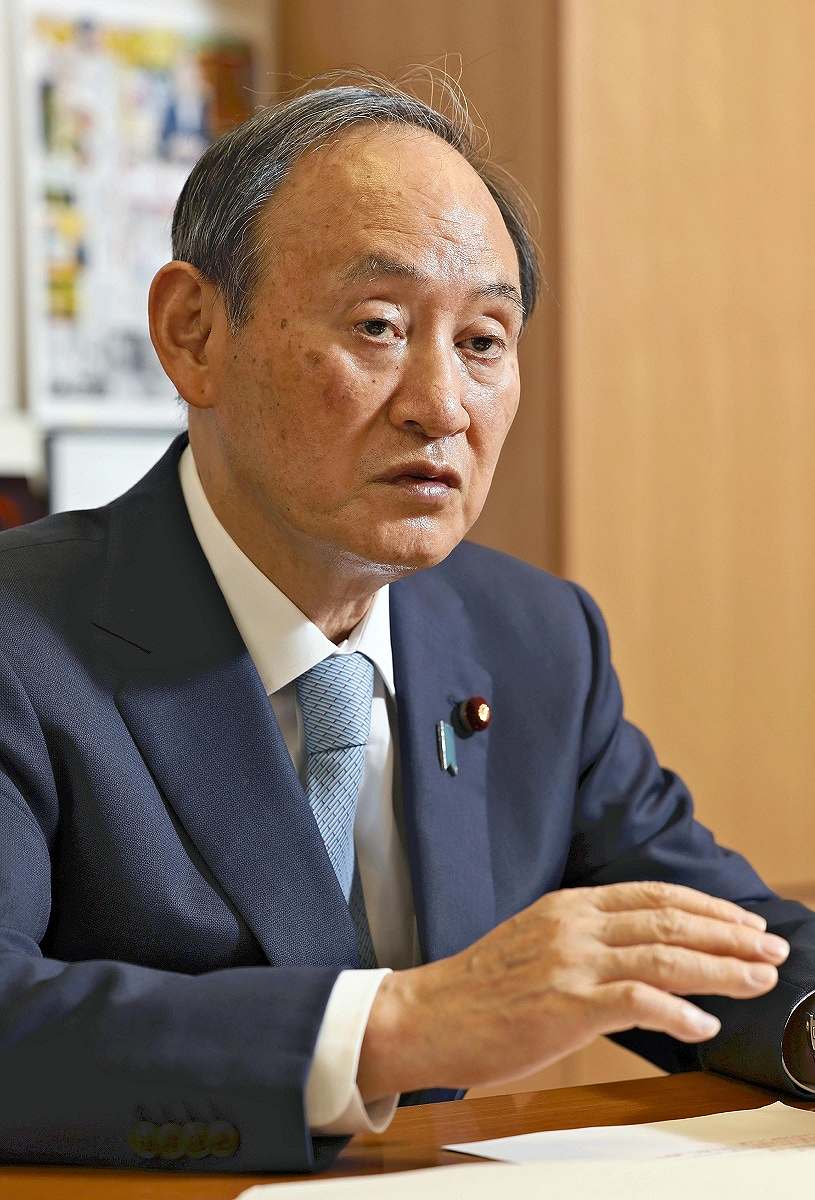Japan Ex-PM Yoshihide Suga Says Govt Must Work as a Whole to Deal with Infectious Diseases

Former Prime Minister Yoshihide Suga speaks during an interview with The Yomiuri Shimbun.
20:00 JST, May 6, 2023
Former Prime Minister Yoshihide Suga says it is vital for the government to work as a whole when tackling infectious disease crises, transcending ministerial and agency boundaries. With the status of the novel coronavirus set to shift to Category V, Suga spoke with Yomiuri Shimbun Staff Writer Koichiro Ashikaga, sharing his thoughts about how he dealt with the COVID-19 pandemic in his capacity as chief cabinet secretary and prime minister.
The Yomiuri Shimbun: What are the lessons to be learned from the COVID-19 pandemic?
Yoshihide Suga: When the infection began to spread, there was no information at all. Initially, it was important to eliminate divisions among ministries and agencies so the government could work on the issue as one. A typical case was the response over the Diamond Princess cruise ship in February 2020. At around 10 p.m. on Feb. 4, 10 of the 31 people aboard the ship who took a PCR test were found to be positive. Thinking that a serious situation had arisen, I immediately rented a hotel room and gathered the then health, labor and welfare minister; the then land, infrastructure, transport and tourism minister; and bureaucrats to discuss how to respond. We decided on a policy of asking those who tested positive to disembark the ship as soon as possible, and I instructed the officials to secure hospital beds for them. I believed that as chief cabinet secretary, I had to take the initiative in handling the situation so ministries and agencies could work together as one.
Yomiuri: What were your thoughts on taking preventative measures to stop the infection from spreading while also maintaining socioeconomic activities?
Suga: A series of very tough decisions had to be made. Infectious disease experts said preventing the infection from spreading was the top priority, and public opinion initially called for strict measures to be taken. Meanwhile, the declaration of the state of emergency during the infection’s first wave brought many economic activities to a halt. As a result, in the April-June period of 2020 the country logged its worst postwar decline in gross domestic product, with an annualized rate of minus 28% from the previous quarter. I was shocked to see that. We had to maintain socioeconomic activities and people’s livelihoods. Anti-infection measures after the second declaration of the state of emergency focused on restaurants; experts said doing so would be “highly effective.” Compared to other countries, the unemployment rate didn’t rise much and the numbers for infections and deaths were low. Although the response received a lot of criticism, I feel it was a reasonable response.
Yomiuri: COVID-19 vaccination in Japan initially lagged behind the West, before catching up and realizing one of the highest vaccination rates in the world.
Suga: We believed that vaccination was key. This stance [of relying on vaccination] was belittled as a one-way approach. We set a goal of 1 million shots each day to show our determination, or rather that we were resolute about winning. The government made preparations and arrangements, but realistically, the vaccination process couldn’t have progressed without the cooperation of people on the front line at local medical care and nursing care service facilities. They worked harder than expected and I felt that the people of Japan are really great.
Yomiuri: In the fifth wave in the summer of 2021, there was a string of cases in which infected people were unable to be hospitalized due to a lack of hospital beds and died at home.
Suga: We were determined that Japan’s medical system had to fight against COVID-19 with all its might, but there were hospitals in urban cities where beds were not used as planned. For this reason, for example, we asked the Japan Community Health care Organization (JCHO), an independent administrative agency, to prepare designated beds for COVID-19, and the National Hospital Organization to increase the number of COVID-19 hospital beds in Tokyo. In times of crisis, national and public medical institutions need to take the lead by setting an example. That was my thought.
Top Articles in Politics
-

Japan PM Takaichi’s Cabinet Resigns en Masse
-

Sanae Takaichi Elected Prime Minister of Japan; Keeps All Cabinet Appointees from Previous Term
-

Japan’s Govt to Submit Road Map for Growth Strategy in March, PM Takaichi to Announce in Upcoming Policy Speech
-

LDP Wins Historic Landslide Victory
-

LDP Wins Landslide Victory, Secures Single-party Majority; Ruling Coalition with JIP Poised to Secure Over 300 seats (UPDATE 1)
JN ACCESS RANKING
-

Producer Behind Pop Group XG Arrested for Cocaine Possession
-

Japan PM Takaichi’s Cabinet Resigns en Masse
-

Man Infected with Measles Reportedly Dined at Restaurant in Tokyo Station
-

Israeli Ambassador to Japan Speaks about Japan’s Role in the Reconstruction of Gaza
-

Videos Plagiarized, Reposted with False Subtitles Claiming ‘Ryukyu Belongs to China’; Anti-China False Information Also Posted in Japan





















